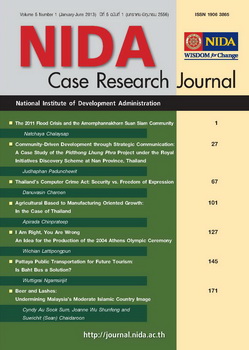Thailand’s Computer Crime Act: Security vs. Freedom of Expression
Abstract
In the Summer of 2012, two independent decision makers sat in their respective offices on opposite sides of the globe, attempting to determine the best course of action with respect to the Computer Crime Act (hereinafter referred to as “the Act”) that the Thai government had promulgated in 2007. The Act had been motivated by the growing concern over computer and Internet crimes, but had met mixed reactions from various interest groups, including domestic and foreign Internet firms and political camps.
On one side of the decision was Mr. Thomas Dungen, chief executive office (CEO) of Fatbook.com, who was trying to decide whether to launch a Thai version of his increasingly popular social website. There was no question in his mind but that the need and market potential existed and that there would be a low breakeven point and a correspondingly high return on investment -- financial outcomes that would benefit the firm tremendously as the day approached when he and his collaborators opted to take the company through an initial public offering (IPO). His uncertainty and hesitation were attributable to his concern that that the Act spread liability for infractions rather broadly. That is, the internet service provider could be -- and in one recent instance, had been -- held jointly liable with those who were directly responsible for committing a particular offense under the Act. This provision, Dungen felt, had the potential to cause the company a lot of grief. Were his firm to launch a Thai Fatbook and later learn that an employee or a user stood accused of violating the Act, not only would the firm face a public relations nightmare, but possible suspension of the firm's permission to do business in Thailand, along with the prospect of prison time for whomever the authorities determined to be liable for the violation of the Act.
Dungen found the decision a particularly difficult one to make. On the one hand, the opening of a Thai Fatbook held the always welcome promise of handsome financial gains from additional advertising revenues, along with increased popularity and prestige that would attract even larger numbers of users, thereby yielding a larger base to factor into advertising charges and, in essence, set up a kind of “virtuous cycle.” On the other hand, the prospect of later finding himself and his firm accused of having run afoul of certain provisions of the Act due to some website user’s actions or inactions and thereby being obliged to defend both his firm and himself personally from criminal prosecution – this was a prospect of unknowable probability that continued to give Dungen great pause. As an entrepreneur of the first order, he appreciated that business gain was always predicated on the taking of a calculated risk. But, he wondered, were the risks in this instance really worth the potential gain?
Meanwhile, at Government House, the seat of the Thai government in Bangkok, Thailand, the Prime Minister, Yingluck Shinawatra, was wrestling with an equally difficult decision — i.e., whether to put her government squarely in favor of rescinding the Act (as some stakeholders were demanding) or in favor of leaving the Act as it was (as other stakeholders were insisting). In common with Dungen, who was wrestling with a different but interrelated facet of the issue in his office half way across the globe, the prime minister was finding that the decision as to which way to go was no easy task, not the least because there were powerful and influential forces on both sides of the issue.
Arrayed in opposition to the law was an amalgam of interests that were convinced that the Act was a serious affront and impediment to freedom of expression and other values deemed essential to the nurturance and preservation of a democratic society. Further, certain political voices within the anti-Act camp were convinced that some provisions of the Act lent themselves to abuse in that they were subject to being used as weapons against upstart political forces that the traditional power centers perceived as threats. These groups were steadfast in the belief that for Thai democracy to take root and flourish, it was of paramount importance that the right of the people to express their views on all manner of issues not be squelched through laws threatening severe retribution.
In addition, among other sub-groups were foreign business interests such as Fatbook who, although not directly engaged in attempts to influence government policy on the matter, were nonetheless accustomed to doing business in environments with less draconian laws governing the uses of advanced communication technology, such as the Internet. These groups not only represented potential new foreign investment, but also avenues by which Thailand's stature as a "technology-ready" society, making maximum use of advanced communication technology, could be enhanced.
Other influential and powerful interest groups, however, had taken a decidedly different position on the Act. For example, the all-important military establishment and their allies in the royalist camp were adamant in their position that the Act was not to be touched. For a variety of reasons, they deemed the law – in particular, its lese majeste provisions -- an important means by which to preserve the essential underpinnings of the Thai state and society. Because of the military’s well-known past tendency to employ extra-political means to enforce its views, Prime Minister Shinawatra knew that, quite likely, military personages would be carefully monitoring any actions that she might take concerning the disposition of the Act. Indeed, if she needed any reminder of how decisively the military could act when it felt that a government was proceeding in the wrong direction, the military’s dissolution of the government of her elder brother (Thaksin Shinawatra) in September 2006 was a poignant and ever-present reminder.





